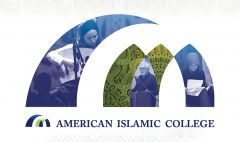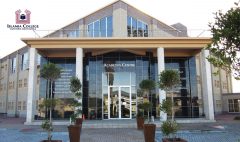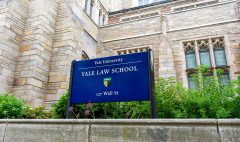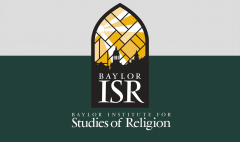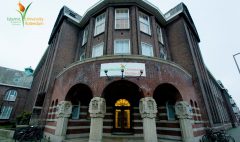Islamic and Middle Eastern Studies (IMES)
October 12, 2017 2023-07-10 12:08Islamic and Middle Eastern Studies (IMES)
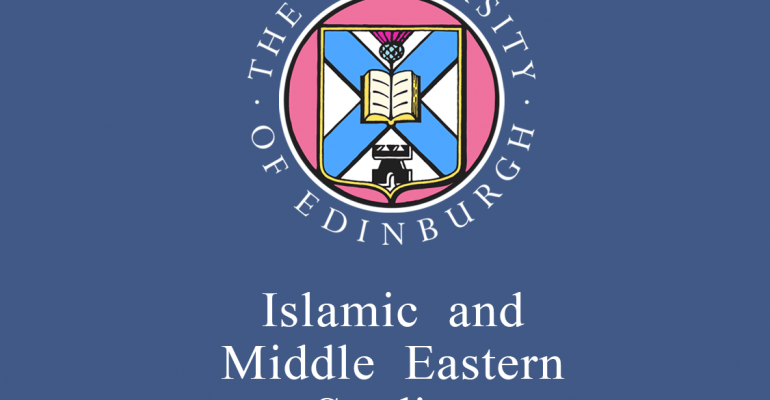
Islamic and Middle Eastern Studies (IMES)
School of Literatures, Languages and Cultures
The University of Edinburgh
Islamic and Middle Eastern Studies was established in 1980 through an amalgamation of the old Departments of Arabic, Turkish and Persian (established in 1912, 1950 and 1951 respectively).
During the 18th and 19th centuries Arabic attracted primarily theological students who recognized the relevance of Semitic philology to their discipline. Persian was taught to meet the requirements of the Indian Civil Service. Muir’s historical interest presaged a gradual shift away from the treatment of Arabic and Islamic Studies as little more than elements in a Christian theological curriculum.
The first step in this direction came with the appointment of Dr Edward Robertson as the first full-time lecturer in Arabic in 1912. Robertson is mainly remembered for his part in cataloguing the Islamic manuscripts acquired by the University Library through the generosity of John B Baillie, grandson of the collector Lt-Col John Baillie of Leys and of the Indian Civil Service. Among the most valuable and best-known items in this collection are the world history of the Mongol vizier Rashid al-Din, written and illustrated in Tabriz c. AD 1306, and the collected poems of Hafiz of Shiraz.
Edinburgh’s present international reputation in the field of Islamic Studies is closely tied to the name of William Montgomery Watt. His Free Will and Predestination in Early Islam (1949) was the first of more than twenty books on Islamic subjects. Notable among these are his Muhammad at Mecca (1953) and Muhammad at Medina (1956), summarized in the single-volume Muhammad, Prophet and Statesman (1961). Among works that have explored the formation of Islamic thought and civilization is Islam and the Integration of Society (1961) and a work of a somewhat different kind, but equally important was his Muslim Intellectual (1963), a definitive study of the great Muslim thinker Al-Ghazali.
Degree Programs
– MA Honours in Islamic Studies:
The Islamic Studies degree at Edinburgh combines the study of the rich intellectual heritage of Islam, with the study of the religion and culture of Islam in the modern world. It is designed to give students a thorough grounding in the history and traditions of Islam, as well as the ability to think critically and comparatively about Islam and other religious traditions.
– MA Honours in Middle Eastern Studies
– MA Honours in Arabic Studies
– MA Honours in Persian Studies
Research Programs
The MScR program is a one-year program that allows you to develop your research skills through the submission of a portfolio of 30,000 words. The flexible nature of the program allows you to study at Masters level but in a manner tailored to your own interests. Although you may choose to audit classes, you do not normally attend taught courses but work individually with your supervisor using library resources.
– PhD in IMES:
The PhD degree is a research program pursued over a period of usually three or four years (full-time) or up to six years (part-time). Candidates develop their research skills as they pursue their research topic under the supervision of two academics. This culminates in the submission of a dissertation of not more than 100,000 words which is read by two examiners and defended in a viva. A doctorate is awarded if the thesis is judged to have made a definite and original contribution to the field of knowledge.
Research projects in which members of the department of Islamic & Middle Eastern Studies are involved include:
- Contextualizing Community: Diasporas of the Modern Middle East
- The Umayyad Empire: History, Art and Culture in the First Century of Islam
- Early Islamic Empire: Re-framing the Umayyads
- The Long 1890s in Egypt
- The Network for the Study of Holy Places in Islam
- Rashid al-Din’s World History
Facilities and Resources
Students and staff have access to a variety of library and information resources, including a library housed within 19 George Square.
+ Main Library:
- Main Library
- Islamic and Middle Eastern studies in the University’s collections
- Islamic and Middle Eastern studies databases
- Islamic and Middle Eastern Room
+ The Islamic Library at IMES:
The Library is staffed by student volunteers and during term time is generally open between 10am and 5pm, Monday to Friday. Borrowing is not permitted, however there are study areas within the library.
+ School-based computing facilities:
Affiliated Centers
These affiliated centers work closely with IMES in coordinating research, teaching and special events. Each of these centers also conducts outreach and knowledge transfer activities.
IMES staff have played a central role in attracting external funding for the establishment of specialist centers for the study of Islam, the Middle East and Islamic World, as well as the Arabic language at the University of Edinburgh.
- Centre for the Advanced Study of the Arab World
CASAW was established in 2006 as a collaborative center for the study of Arabic, involving three institutions: University of Edinburgh, University of Durham and Manchester University.
- Prince Alwaleed Bin Talal Centre
In 2007 the University of Edinburgh was awarded a grant to establish the Prince Alwaleed Bin Talal Centre for the Study of Islam in the Contemporary World, which aims to improve public knowledge and awareness of Islamic civilization and of Muslims in Britain.
Contacts
- Address: University of Edinburgh, 19 George Square, Edinburgh EH8 9LD, UK
- Telephone: +44 131 650 4182
- Fax: +44 131 650 6804
- Email: imes@ed.ac.uk
- Website: www.imes.ed.ac.uk


